|
Nirathanka has conducted a Training Programme on the Prevention of Sexual Harassment at Saddles International Automotive & Aviation Interiors Pvt Ltd. On 24th of March 2023. More than 150 Employees participated in the training program, which was well received.
0 Comments
PARIS — Half of women scientists worldwide have been victims of workplace sexual harassment at some point in their careers, reported a survey published Thursday, March 16.
The poll, which included more than 5,000 researchers across 117 countries, showed 49 percent of women scientists saying that they had “personally experienced at least one situation” of harassment. Nearly half of the cases took place after the MeToo movement emerged in 2017, according to the survey conducted by the Ipsos polling firm on behalf of the L’Oreal Foundation. For 65 percent of the women, the harassment had a negative impact early in their careers. Yet only one in five victims reported her experience to the organization concerned. For more details kindly click the below link: https://newsinfo-inquirer-net.cdn.ampproject.org/c/s/newsinfo.inquirer.net/1744683/survey-half-of-women-scientists-worldwide-sexually-harassed/amp He and she attended a company-nominated training program outside the company premises. After the training program, she complained to the ICC that he sexually harassed her during the training program. Is this complaint valid under the Sexual Harassment of Women at Workplace (Prevention, Prohibition, and Redressal) Act, 2013?
YES. The incident took place during a training program, and according to the Act, the venue of the training program is the workplace. The Prevention, Prohibition, and Redressal (PPR) approach is a key feature of the POSH Act, 2013. This approach aims to create safe and harassment-free workplaces for women.
Prevention: It refers to the steps taken by the employer to prevent sexual harassment in the workplace. Employers must take measures such as establishing internal committees, conducting awareness and sensitization programs and implementing policies and guidelines to prevent sexual harassment in the workplace. Prohibition: This refers to the prohibition of sexual harassment in the workplace. Here, prohibition is strictly related to restricting unwelcoming acts/behaviors in the workplace related to sexual harassment. Employers must communicate such restrictions through policy, process, and awareness programs. They must ensure that their employees, including visitors, are aware of such prohibitions. Redressal: This refers to the mechanisms put in place to address and redress complaints of sexual harassment in the workplace. Employers are required to establish internal committees to address sexual harassment complaints, and employees have the right to file complaints with the committee if they experience any form of sexual harassment. What kinds of harassment are illegal as per POSH Act, 2013?
The Prevention of Sexual Harassment at Workplace Act, 2013 (POSH Act) defines Sexual Harassment as any unwelcome acts or behavior, whether directly or by implication. In line with this, the following acts are considered illegal:
A male worker kept a romantic song as his phone ringtone. Hearing this, a female colleague filed a sexual harassment complaint against the male worker with the ICC. Is it valid?
→Whether this complaint is valid or not depends on the particular circumstances of the case and the provisions of the POSH Act, 2013. In this context, it may be difficult to determine whether a male worker's choice of ringtone is sufficient to constitute sexual harassment. →As per POSH Act, sexual harassment is unwelcome sexual conduct, whether verbal, non-verbal, or physical. If the male worker's choice of ringtone is based on sexual content or innuendo, or if it creates a hostile work environment for the female colleague, it may be considered sexual harassment. →However, if the ringtone is simply a romantic song with no sexually explicit content, it may not be considered sexual harassment under the law. It is essential to consider the context in which the ringtone is played, the impact it has on the female colleague, and whether it interferes with her ability to work in a comfortable and safe environment. →The ICC must thoroughly investigate the matter, gather evidence and determine whether the male worker's conduct meets the definition of sexual harassment of the act before proceeding. The wife & husband work in the same company and are allowed to work from home from 8:00 am to 5:00 pm. They took financial benefit from the company to buy the required furniture to work from home. After a few days, the wife complained to ICC that her husband had sexually harassed her during working hours. Is this complaint valid under the Sexual Harassment of Women at Workplace (Prevention, Prohibition, and Redressal) Act, 2013?
YES As per POSH Act 2013, we have an excellent POSH policy and constituted an IC Committee. As we meet these requirements, we do not have time to provide POSH training to employees due to production pressure. Is this okay?
No, it is not okay. As per the POSH Act 2013, every employer must provide awareness through training programs at regular intervals for all employees (including contract labour & trainees) on the prevention of sexual harassment. Such programs must sensitize the employees to the provisions of the Act. The POSH awareness sessions must cover the following:
Can inappropriate behavior occurring outside of the factory premises still be considered a violation of the POSH Act?
Yes. The inappropriate behavior that occurs outside the workplace but has a nexus to the workplace can still be considered a violation of the POSH Act. As per section 2 (o) (v) of the Act, the workplace includes: any place visited by the employee arising out of or during the course of employment including transportation by the employer for undertaking such journey. In line with this, if a woman employee is subjected to inappropriate behavior by a co-worker, supervisor, or customer during a work-related event or on work-related travel, it will be considered a violation of the POSH Act. Can a person file a complaint of sexual harassment anonymously under POSH?
Yes. The POSH Act allows a person to file a complaint of sexual harassment anonymously. The act allows this to protect the identity of the person making the complaint. This can help the complainant to feel more secure in making the complaint, especially in cases where the complainant may be concerned about victimization. Anonymity can also encourage more people to come forward and report incidents of sexual harassment, which can help to create a safer and more respectful workplace for everyone. The POSH Act recognizes the need for confidentiality in such cases, and complainants have the option to request the ICC not to reveal their identity during the inquiry. However, it is essential to note that submitting an anonymous complaint may affect the credibility of the complaint and investigation. This may limit the ICC's ability to gather evidence and conduct a thorough investigation. In our company, we have ten male employees and no female employees. Is it necessary to constitute an Internal Committee under the POSH Act, 2013?
→Yes. →If a workplace does not have any female employees, it is still necessary to constitute an Internal Committee (IC) under the Prevention of Sexual Harassment (POSH) Act, 2013. →The POSH Act mandates that every workplace with ten or more employees, regardless of gender composition, must establish an IC to address and prevent sexual harassment in the workplace. Can an employer forfeit the gratuity payable to an employee terminated on the grounds of sexual harassment of a woman?
YES. Under the Payment of Gratuity Act 1972, an employer must pay gratuity to an employee who has completed at least five years of continuous service with the company. Sexual harassment can be considered a form of moral turpitude. On the ground of moral turpitude, in the above case, the gratuity payable to the employee may be forfeited. Moral turpitude refers to conduct contrary to the accepted rules of morality and involves dishonesty, fraud, or other forms of depravity. The aggrieved woman requested the Internal Committee (IC) of POSH to allow Advocate to represent in the inquiry process. Is this valid?
→NO. →As per the POSH Act, 2013, both the parties to the complaint are not permitted to bring their Advocates/Legal Practitioners to participate in the IC Inquiry Process. The Company formed the Internal Complaints Committee (ICC) to meet the requirements of the POSH Act - 2013, but it did not include an external member. In this situation, is the committee valid?
NO. As per the POSH Act of 2013, every ICC must include at least one external member who is not associated with the organization or does not work in the same industry. A supervisor complains to HR that one of the female team members is often idle in her workstation without performing the assigned tasks. HR asked him to provide proof for the same. To provide evidence, the supervisor took a photo of the female team member while she was not working at her workstation. The female team member objected to the supervisor's act and reported as sexual harassment to the IC. Is it valid?
→The complaint is not valid as the POSH Act, 2013 defines sexual harassment as any unwelcome physical, verbal, or non-verbal conduct of a sexual nature that could create an intimidating, hostile, or offensive work environment. →The points because the complaint is not valid are:
Can ICC forward sexual harassment complaint to the police without the consent of the aggrieved woman?
→No. →Under the POSH Act, 2013, the Internal Complaints Committee (ICC) cannot forward a complaint of sexual harassment to the police without the consent of the aggrieved woman. →The ICC is responsible for investigating complaints of sexual harassment and making recommendations for appropriate action within the organization. →The ICC may refer a complaint to the police when a settlement has been agreed upon between the parties, but the respondent has failed to comply with the settlement terms. →It is important to respect the confidentiality and privacy of the aggrieved woman during the ICC's proceedings and to ensure that her consent is obtained before taking any further action. The HR manager tells the aggrieved woman not to complain to the ICC about sexual harassment and that he will handle it. Is it valid?
No. It is not valid for the HR Manager to tell an aggrieved woman not to give a complaint to the Internal Complaints Committee (ICC) and that he will handle it himself.
Annual Report must be submitted by January every year to the District Officer nominated by the appropriate government.
Sec.16: Notwithstanding anything contained in the Right to Information Act, 2005, the contents of the complaint made under section 9, the identity and addresses of the aggrieved woman, respondent and witnesses, any information relating to conciliation and inquiry proceedings, recommendations of the Internal Committee or the Local Committee, as the case may be, and the action taken by the employer or the District Officer under the provisions of this Act shall not be published, communicated or made known to the public, press and media in any manner.
Sec.15: The IC shall have regard to •••
Sec.14 authorises the employer to take appropriate disciplinary action against the complainant in line with the service rules/ standing orders of the Company.
NO: The Employer may accept or may not, but so such modifications or alterations or suggest the IC to modify etc are not permissible. The Employer, on receipt of the report, shall act upon the recommendation within sixty days of tis receipt by him.
Sec.13 (3) of the Act provides: That report of the Committee shall have to be deemed as equally as enquiry report in a domestic enquiry. It has to be treated as finding in disciplinary enquiry.Finding and report of the IC shall not be treated as a mere preliminary investigation but a finding in enquiry. Saritha Verma Vs New Delhi Municipal Corporation.2016 LLR 785.Del.HC. WHETHER THE IC CAN RECOMMEND ANY PUNISHMENT AND OR ANY AMOUNT TO BE PAID TO THE AGGREIVED WOMEN?3/2/2023
YES: The IC can recommend suitable punishment in line with the standing orders / service rules/ discipline policies of the Company. The IC can not suggest a particular punishment since it is not under their jurisdiction. The IC is empowered to find the respondent guilty or not guilty. Further, the IC is empowered to suggest a particular amount to be paid to the complainant to be deducted from the salary of the respondent as a relief. Provided that in case the employer is unable to make such deduction from the salary of the respondent due to his being absent from duty or cessation of employment, it may direct the respondent to pay such sum to the aggrieved woman. And further that in case the respondent fails to pay the sum, the Internal Committee can take up with the concerned District Officer to recover the sum as a debt and pay to the aggrieved women.
YES: She can seek transfer to different location of work, or grant special leave for three months. The Employer should consider her request and depending on the situations, reliefs to be provide under Sec.12.
YES: A compliant can be filed. She can take the assistance of IC Members as well. The proceedings before the Magistrate and the enquiry before the IC are independent & even if the charges are not proved before the Court, this has no effect on the findings of IC.
|
Categories
All
Prevention of Sexual Harassment at Workplace (PoSH)50,000 HR PROFESSIONALS ARE CONNECTED THROUGH OUR NIRATHANKA HR GROUPS.
YOU CAN ALSO JOIN AND PARTICIPATE IN OUR GROUP DISCUSSIONS. |

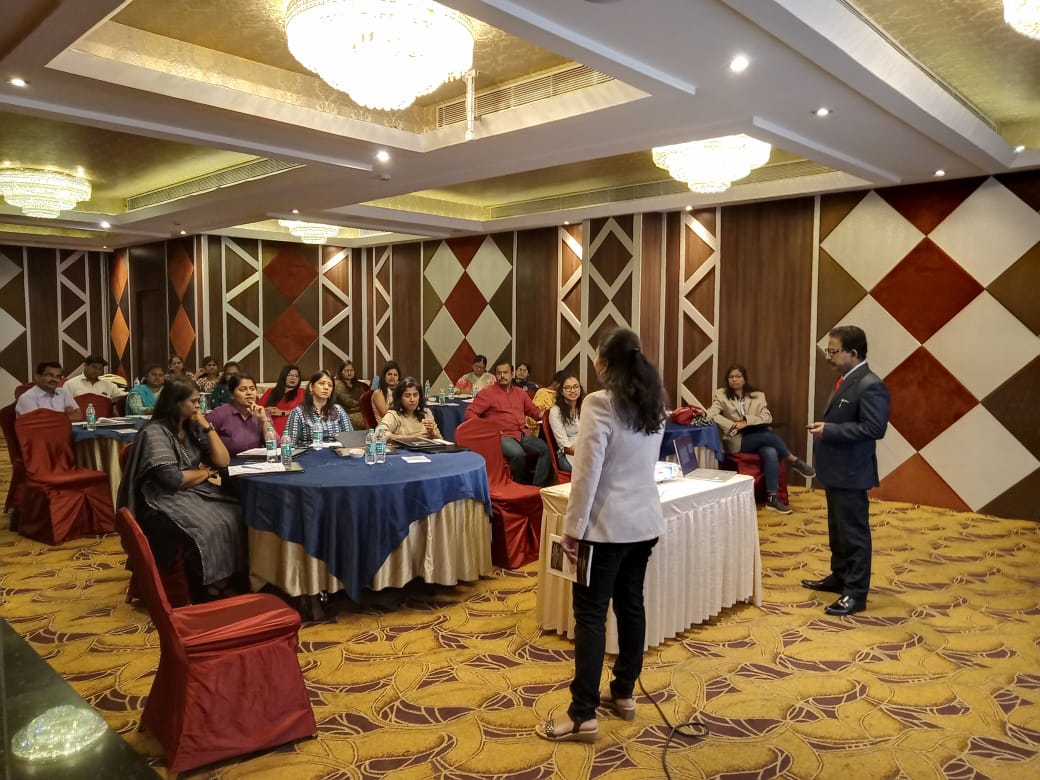

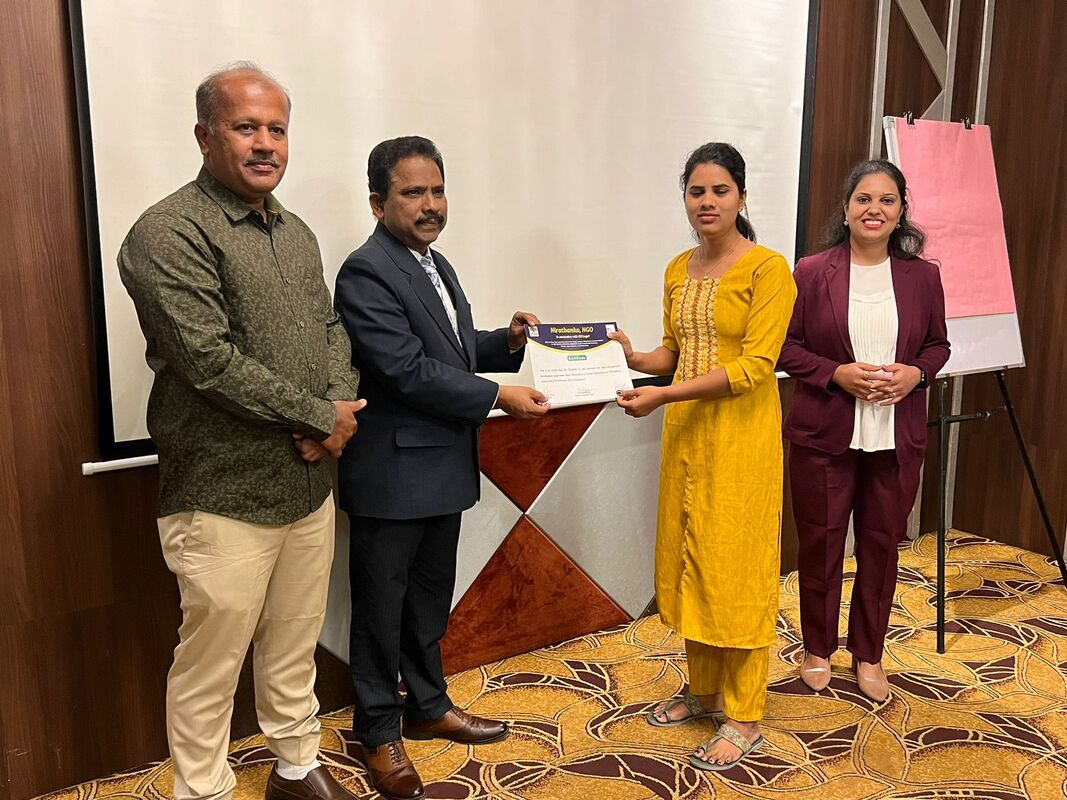
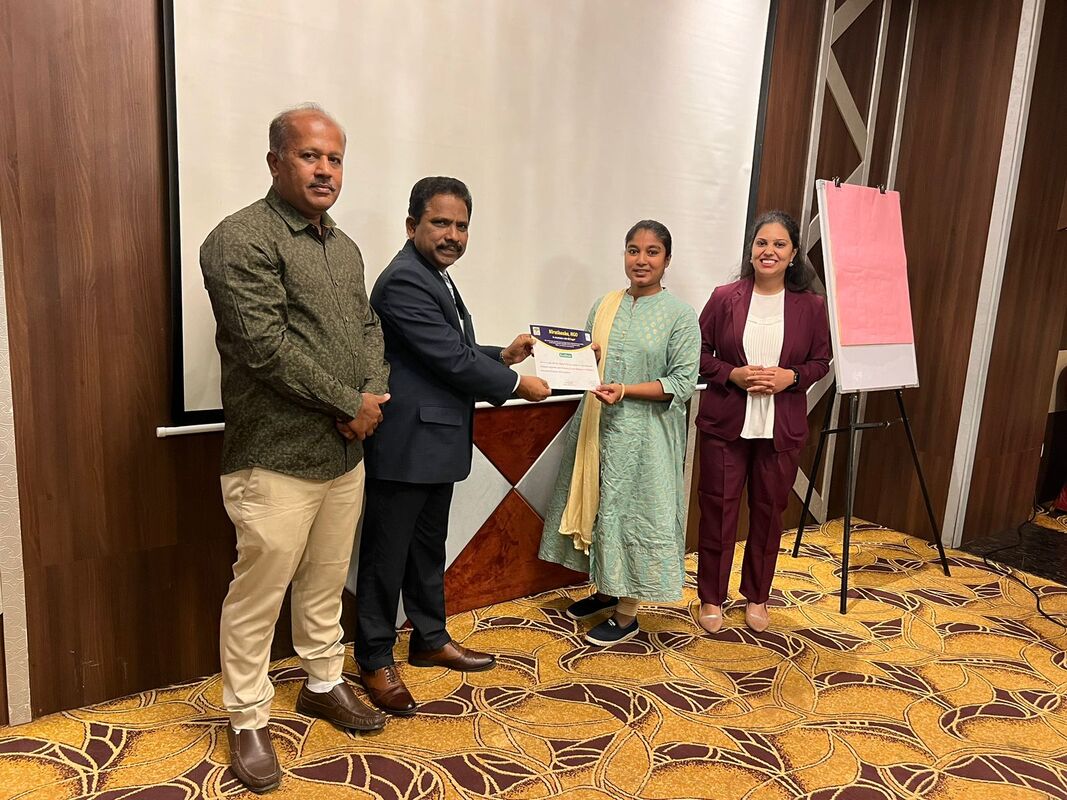
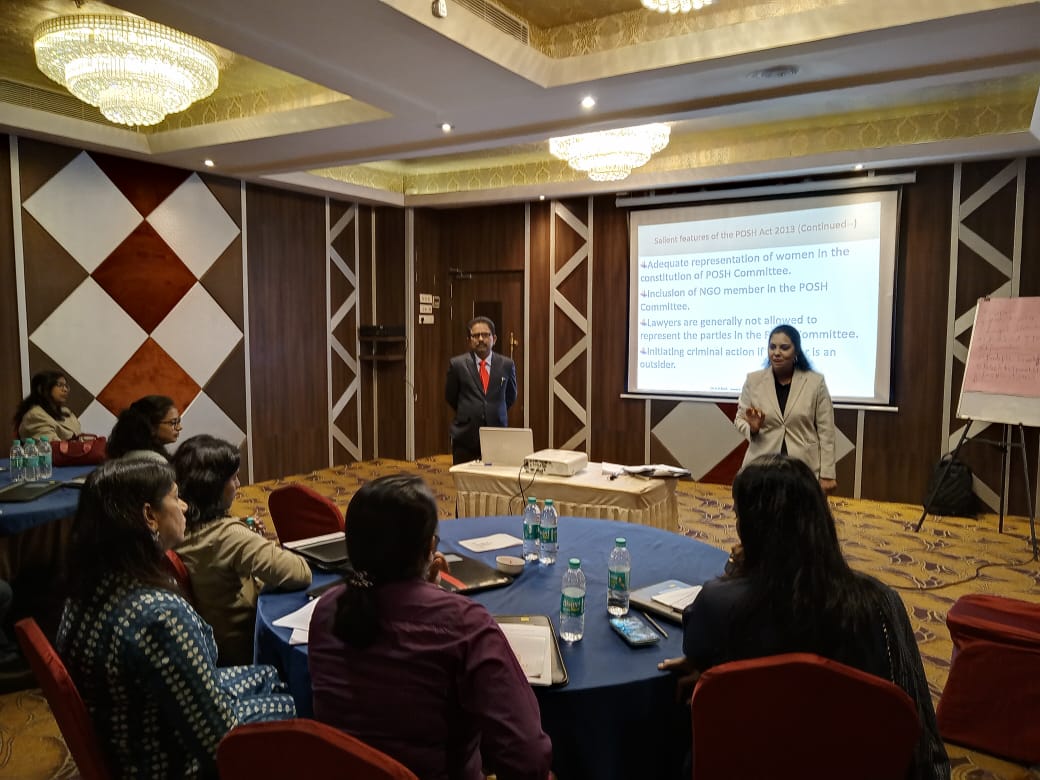
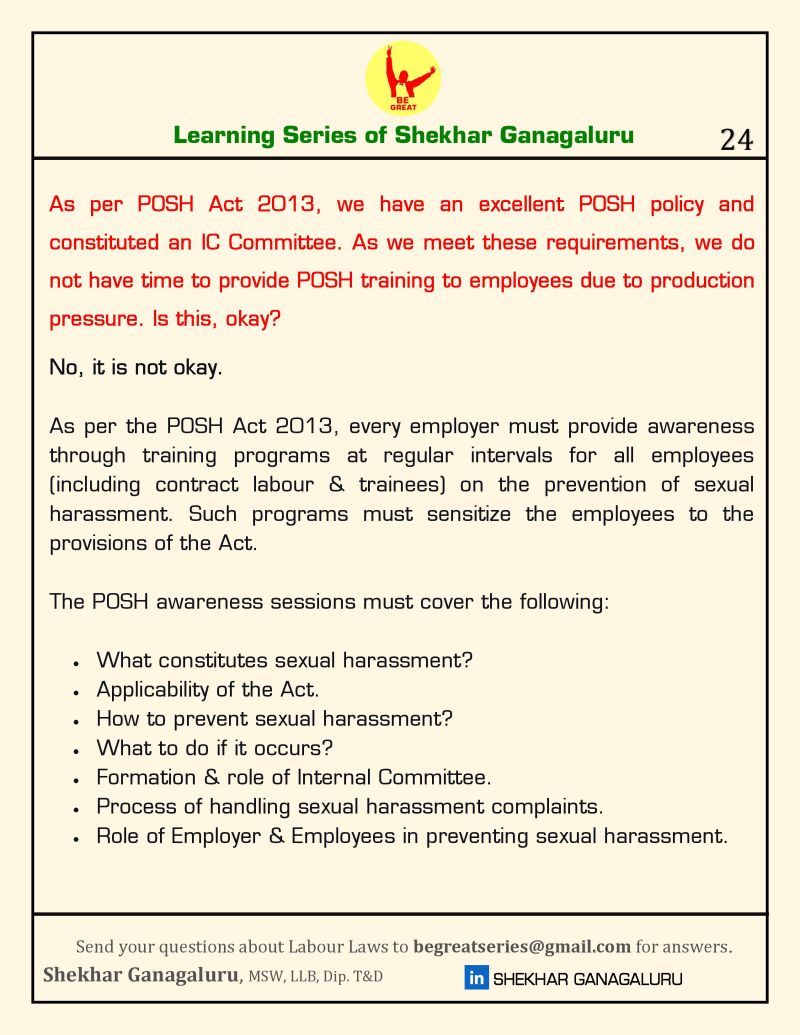
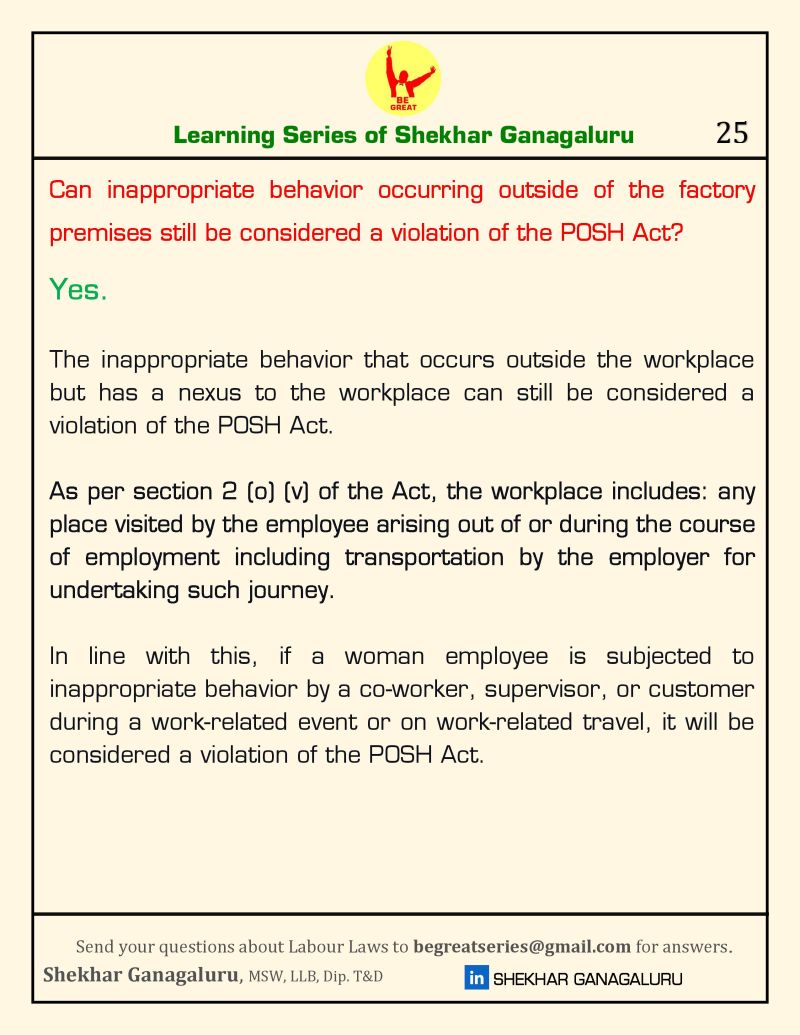
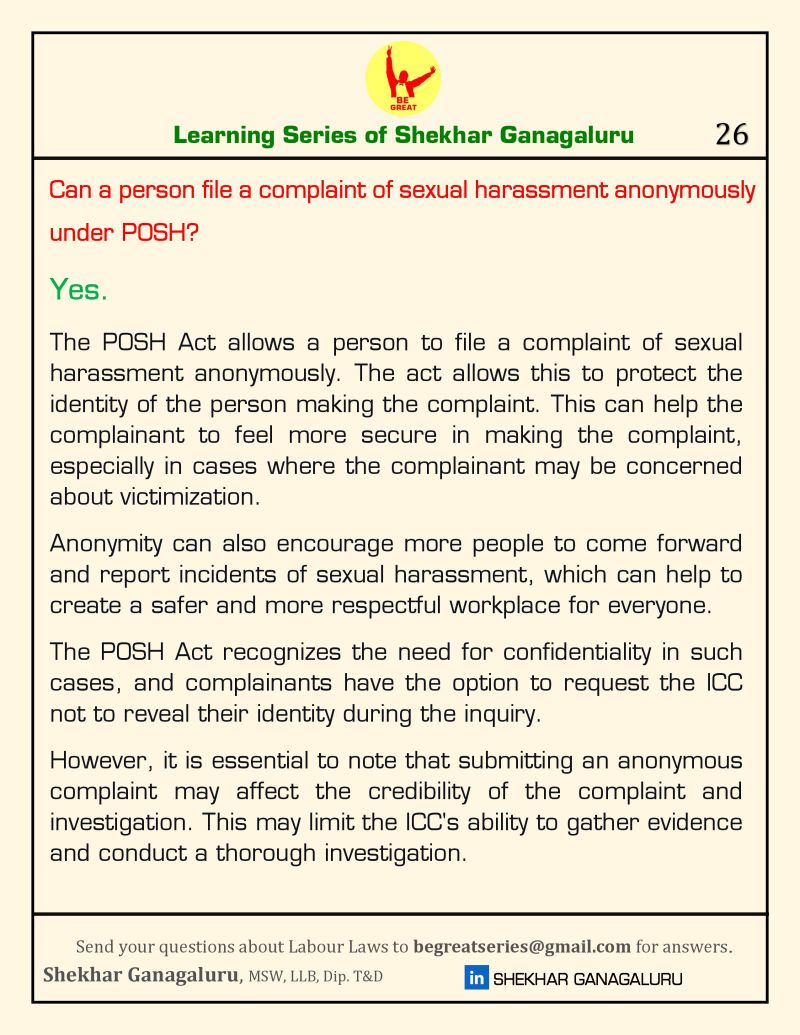
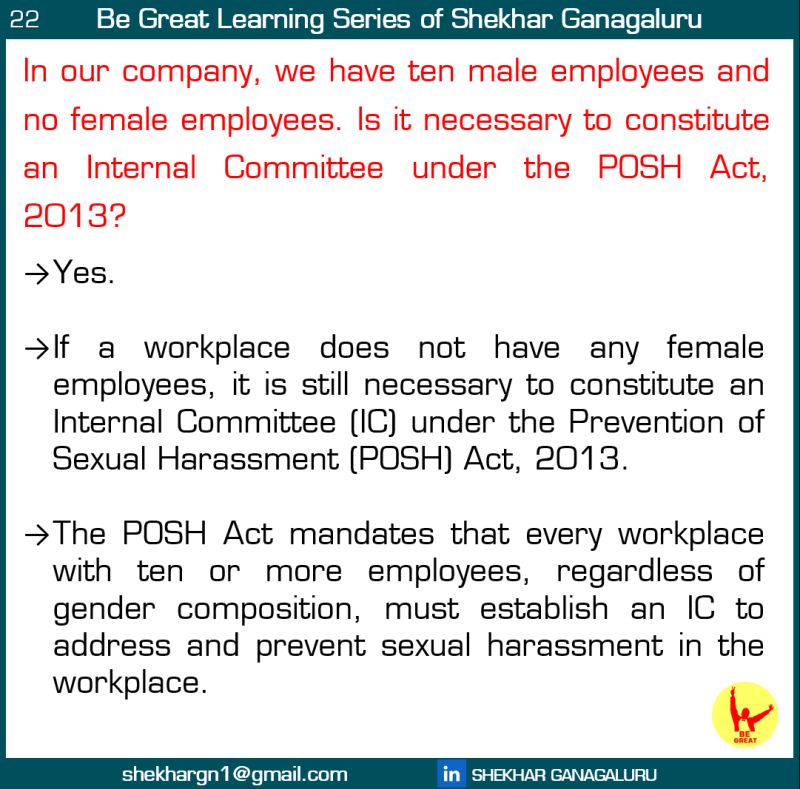
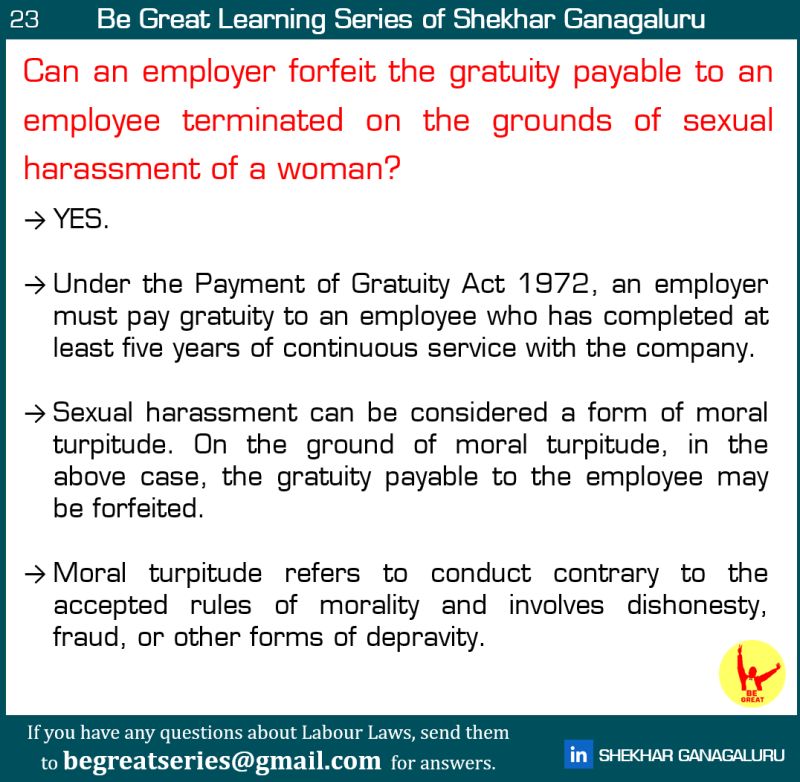

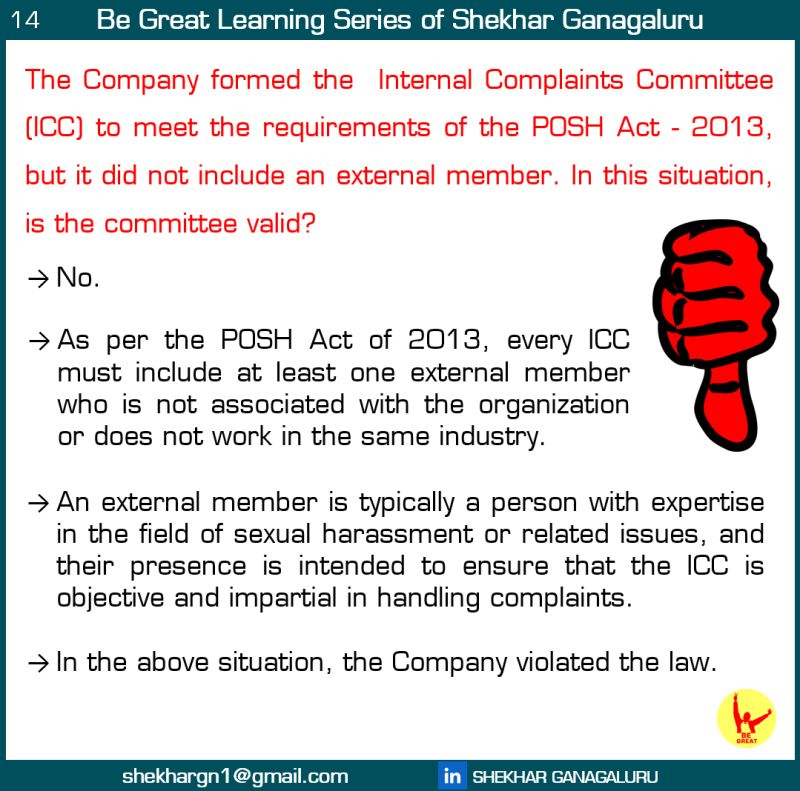

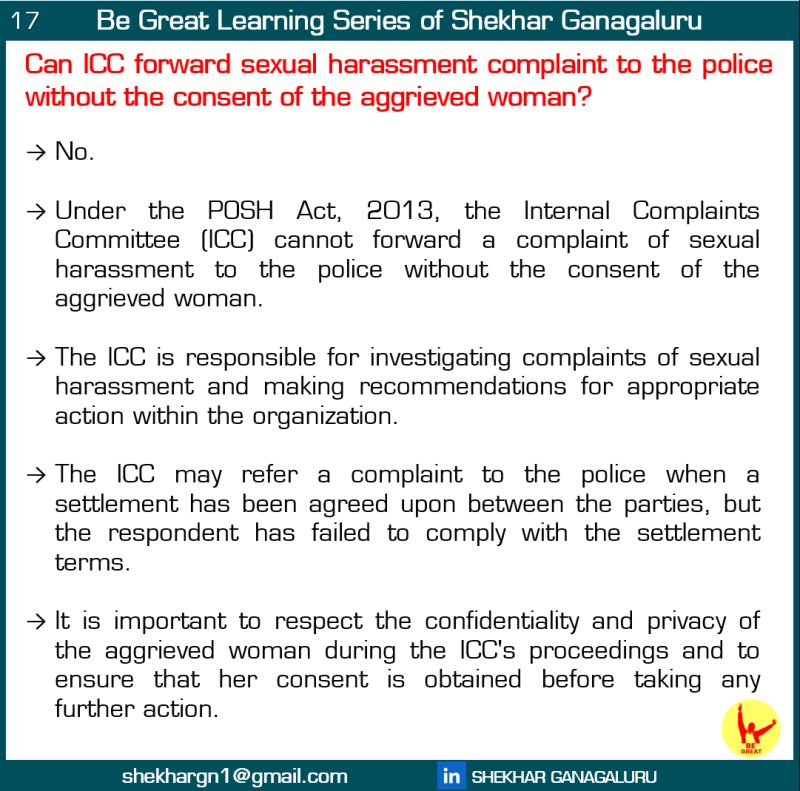
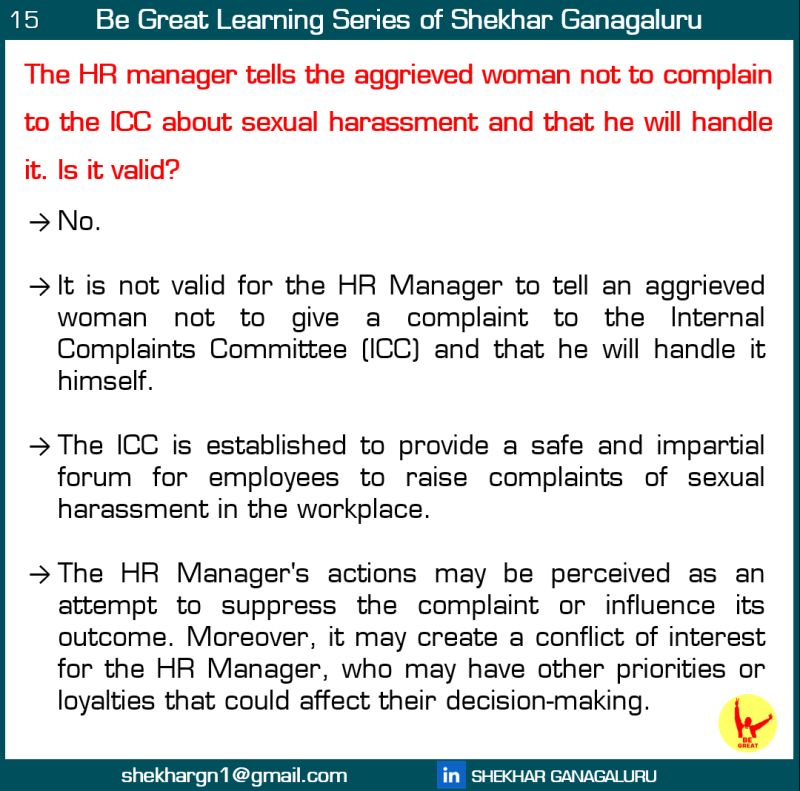









 RSS Feed
RSS Feed





